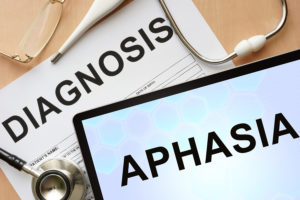Coping with Aphasia
Aphasia is a communication that sometimes occur after an older adult has a stroke, though it can have other causes. It can affect their ability to write, speak, or understand language. It can result in various symptoms. For example, the senior may be able to form a complete sentence in their head, but be unable to speak it, instead uttering short, incomplete sentences. They may want to say something like, “I don’t care for this food,” but only be able to say, “food bad.” Or, they could use made up words that make no sense to anyone but themselves. Whatever form aphasia takes, it can be difficult for seniors and their families to deal with.
However, there are some things that can make coping with aphasia easier, such as the tips below.

Elderly Care Wayne NJ – Coping with Aphasia
Seek Treatment
In some cases, aphasia goes away on its own as the person’s brain heals. However, they may require treatment to regain communications skills. Working with a speech therapist can help seniors to re-learn how to speak or write. There are also some medications used to treat aphasia that improve blood flow in the brain and help it to heal more quickly. However, it should be noted that some people never completely regain the ability to communicate regardless of treatment.
Educate Friends and Family
Aphasia can cause friends and family to stay away because they find it frustrating to talk to the older adult. They may also feel embarrassed for the senior or find it hard to see someone they love struggling. It can help to educate them about what aphasia is and how they can communicate better with the person. Using shorter sentences, gestures, and touch can help the senior to understand them better. They’ll also need to be more patient and give the senior a little more time to respond than usual since it can take longer for them to get their thoughts out.
Keep Paper and Pencil Handy
Some people with aphasia may be able to understand written words better than spoken ones. They may also find it easier to communicate in writing than verbally. Keeping a pencil and paper handy to write short sentences can help to get the meaning across. It might also be able to create a flip book of pictures the senior can use to communicate. For example, they may show a picture of a glass of water when they are thirsty.
Elderly care can assist older adults with aphasia to communicate more effectively as well. Because elderly care providers are experienced in working with seniors, they may have encountered people with aphasia in the past and have the skills to communicate with them effectively. In fact, elderly care agencies typically try to match the experience of their staff members with the needs of the older adult, so it’s likely the staff member(s) assigned to your aging relative will have tips and tricks for enabling better communication.
Sources: https://www.mayoclinic.org/diseases-conditions/aphasia/diagnosis-treatment/drc-20369523
https://www.asha.org/public/speech/disorders/FamilyAdjustmentAphasia/
https://www.mayoclinic.org/diseases-conditions/aphasia/symptoms-causes/syc-20369518
If you or a senior family member are considering hiring Elderly Care Services in Wayne NJ, please contact the caring staff at Caring Solutions Home Care LLC. In-home senior care servicing Bergen & Passaic Counties. Call today at (973) 427-3553.
- Planning a Beach Trip With Your Elderly Loved One - March 24, 2025
- How Overnight Care At Home Helps Seniors - March 10, 2025
- What Lifestyle Changes Should Seniors Expect with High Blood Pressure? - February 19, 2025

